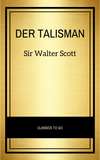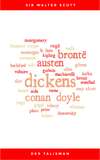Buch lesen: «Waverley; Or 'Tis Sixty Years Since — Complete»
PUBLISHERS' NOTE
It has long been the ambition of the present publishers to offer to the public an ideal edition of the writings of Sir Walter Scott, the great poet and novelist of whom William Hazlitt said, 'His works are almost like a new edition of human nature.' Secure in the belief not only that his writings have achieved a permanent place in the literature of the world, but that succeeding generations will prize them still more highly, we have, after the most careful planning and study, undertaken the publication of this edition of the Waverley Novels and the complete poetical writings.
It is evident that the ideal edition of a great classic must be distinguished in typography, must present the best available text, and must be illustrated in such a way as at once to be beautiful in itself and to add to the reader's pleasure and his understanding of the book. As to the typography and text, little need be said here. The format of the edition has been most carefully studied, and represents the use of the best resources of The Riverside Press. The text has been carefully edited in the light of Scott's own revisions; all of his own latest notes have been included, glossaries have been added, and full descriptive notes to the illustrations have been prepared which will, we hope, add greatly to the reader's interest and instruction in the reading of the novels and poems.
Of the illustrations, which make the special feature of this edition, something more may be said. In the case of an author like Sir Walter Scott, the ideal edition requires that the beautiful and romantic scenery amid which he lived and of which he wrote shall be adequately presented to the reader. No other author ever used more charming backgrounds or employed them to better advantage. To see Scotland, and to visit in person all the scenes of the novels and poems, would enable the reader fully to understand these backgrounds and thereby add materially to his appreciation of the author.
Before beginning the preparation of this edition, the head of the department having it in charge made a visit in person to the scenes of the novels and poems, determined to explore all the localities referred to by the author, so far as they could be identified. The field proved even more productive than had been at first supposed, and photographs were obtained in sufficient quantity to illustrate all the volumes. These pictures represent the scenes very much as Scott saw them. The natural scenery—mountains, woods, lakes, rivers, seashore, and the like—is nearly the same as in his day. The ruins of ancient castles and abbeys were found to correspond very closely with his descriptions, though in many instances he had in imagination rebuilt these ruins and filled them with the children of his fancy. The scenes of the stories extend into nearly every county in Scotland and through a large part of England and Wales. All of these were thoroughly investigated, and photographs were made of everything of interest. One of the novels has to do with France and Belgium, one with Switzerland, one with the Holy Land, one with Constantinople, and one with India. For all of these lands, which Scott did not visit in person, and therefore did not describe with the same attention to detail as in the case of his own country, interesting pictures of characteristic scenery were secured. By this method the publishers have hoped to bring before the reader a series of photographs which will not only please the eye and give a satisfactory artistic effect to the volumes, but also increase the reader's knowledge of the country described and add a new charm to the delightful work of the author. In addition to the photographs, old engravings and paintings have been reproduced for the illustration of novels having to do with old buildings, streets, etc., which have long since disappeared. For this material a careful search was made in the British Museum, the Advocates' Library and City Museum, Edinburgh, the Library at Abbotsford, the Bibliotheque Nationale, Paris, and other collections.
It has been thought, too, that the ideal edition of Scott's works would not be complete without an adequate portrayal of his more memorable characters. This has been accomplished in a series of frontispieces specially painted for this edition by twenty of the most distinguished illustrators of England.
4 PARK STREET, BOSTON.
ADVERTISEMENT TO THE WAVERLEY NOVELS
IT has been the occasional occupation of the Author of Waverley, for several years past, to revise and correct the voluminous series of Novels which pass under that name, in order that, if they should ever appear as his avowed productions, he might render them in some degree deserving of a continuance of the public favour with which they have been honoured ever since their first appearance. For a long period, however, it seemed likely that the improved and illustrated edition which he meditated would be a posthumous publication. But the course of the events which occasioned the disclosure of the Author's name having, in a great measure, restored to him a sort of parental control over these Works, he is naturally induced to give them to the press in a corrected, and, he hopes, an improved form, while life and health permit the task of revising and illustrating them. Such being his purpose, it is necessary to say a few words on the plan of the proposed Edition.
In stating it to be revised and corrected, it is not to be inferred that any attempt is made to alter the tenor of the stories, the character of the actors, or the spirit of the dialogue. There is no doubt ample room for emendation in all these points,—but where the tree falls it must lie. Any attempt to obviate criticism, however just, by altering a work already in the hands of the public is generally unsuccessful. In the most improbable fiction, the reader still desires some air of vraisemblance, and does not relish that the incidents of a tale familiar to him should be altered to suit the taste of critics, or the caprice of the Author himself. This process of feeling is so natural, that it may be observed even in children, who cannot endure that a nursery story should be repeated to them differently from the manner in which it was first told.
But without altering, in the slightest degree, either the story or the mode of telling it, the Author has taken this opportunity to correct errors of the press and slips of the pen. That such should exist cannot be wondered at, when it is considered that the Publishers found it their interest to hurry through the press a succession of the early editions of the various Novels, and that the Author had not the usual opportunity of revision. It is hoped that the present edition will be found free from errors of that accidental kind.
The Author has also ventured to make some emendations of a different character, which, without being such apparent deviations from the original stories as to disturb the reader's old associations, will, he thinks, add something to the spirit of the dialogue, narrative, or description. These consist in occasional pruning where the language is redundant, compression where the style is loose, infusion of vigour where it is languid, the exchange of less forcible for more appropriate epithets—slight alterations in short, like the last touches of an artist, which contribute to heighten and finish the picture, though an inexperienced eye can hardly detect in what they consist.
The General Preface to the new Edition, and the Introductory Notices to each separate work, will contain an account of such circumstances attending the first publication of the Novels and Tales as may appear interesting in themselves, or proper to be communicated to the public. The Author also proposes to publish, on this occasion, the various legends, family traditions, or obscure historical facts which have formed the ground-work of these Novels, and to give some account of the places where the scenes are laid, when these are altogether, or in part, real; as well as a statement of particular incidents founded on fact; together with a more copious Glossary, and Notes explanatory of the ancient customs and popular superstitions referred to in the Romances.
Upon the whole, it is hoped that the Waverley Novels, in their new dress, will not be found to have lost any part of their attractions in consequence of receiving illustrations by the Author, and undergoing his careful revision.
ABBOTSFORD, January, 1829.
GENERAL PREFACE TO THE WAVERLEY NOVELS
—-And must I ravel out
My weaved-up follies?
Richard II, Act IV.
Having undertaken to give an Introductory Account of the compositions which are here offered to the public, with Notes and Illustrations, the Author, under whose name they are now for the first time collected, feels that he has the delicate task of speaking more of himself and his personal concerns than may perhaps be either graceful or prudent. In this particular he runs the risk of presenting himself to the public in the relation that the dumb wife in the jest-book held to her husband, when, having spent half of his fortune to obtain the cure of her imperfection, he was willing to have bestowed the other half to restore her to her former condition. But this is a risk inseparable from the task which the Author has undertaken, and he can only promise to be as little of an egotist as the situation will permit. It is perhaps an indifferent sign of a disposition to keep his word, that, having introduced himself in the third person singular, he proceeds in the second paragraph to make use of the first. But it appears to him that the seeming modesty connected with the former mode of writing is overbalanced by the inconvenience of stiffness and affectation which attends it during a narrative of some length, and which may be observed less or more in every work in which the third person is used, from the Commentaries of Caesar to the Autobiography of Alexander the Corrector.
I must refer to a very early period of my life, were I to point out my first achievements as a tale-teller; but I believe some of my old schoolfellows can still bear witness that I had a distinguished character for that talent, at a time when the applause of my companions was my recompense for the disgraces and punishments which the future romance-writer incurred for being idle himself, and keeping others idle, during hours that should have been employed on our tasks. The chief enjoyment of my holidays was to escape with a chosen friend, who had the same taste with myself, and alternately to recite to each other such wild adventures as we were able to devise. We told, each in turn, interminable tales of knight-errantry and battles and enchantments, which were continued from one day to another as opportunity offered, without our ever thinking of bringing them to a conclusion. As we observed a strict secrecy on the subject of this intercourse, it acquired all the character of a concealed pleasure, and we used to select for the scenes of our indulgence long walks through the solitary and romantic environs of Arthur's Seat, Salisbury Crags, Braid Hills, and similar places in the vicinity of Edinburgh; and the recollection of those holidays still forms an oasis in the pilgrimage which I have to look back upon. I have only to add, that my friend still lives, a prosperous gentleman, but too much occupied with graver business to thank me for indicating him more plainly as a confidant of my childish mystery.
When boyhood advancing into youth required more serious studies and graver cares, a long illness threw me back on the kingdom of fiction, as if it were by a species of fatality. My indisposition arose, in part at least, from my having broken a blood-vessel; and motion and speech were for a long time pronounced positively dangerous. For several weeks I was confined strictly to my bed, during which time I was not allowed to speak above a whisper, to eat more than a spoonful or two of boiled rice, or to have more covering than one thin counterpane. When the reader is informed that I was at this time a growing youth, with the spirits, appetite, and impatience of fifteen, and suffered, of course, greatly under this severe regimen, which the repeated return of my disorder rendered indispensable, he will not be surprised that I was abandoned to my own discretion, so far as reading (my almost sole amusement) was concerned, and still less so, that I abused the indulgence which left my time so much at my own disposal.
There was at this time a circulating library in Edinburgh, founded, I believe, by the celebrated Allan Ramsay, which, besides containing a most respectable collection of books of every description, was, as might have been expected, peculiarly rich in works of fiction. It exhibited specimens of every kind, from the romances of chivalry and the ponderous folios of Cyrus and Cassandra, down to the most approved works of later times. I was plunged into this great ocean of reading without compass or pilot; and, unless when some one had the charity to play at chess with me, I was allowed to do nothing save read from morning to night. I was, in kindness and pity, which was perhaps erroneous, however natural, permitted to select my subjects of study at my own pleasure, upon the same principle that the humours of children are indulged to keep them out of mischief. As my taste and appetite were gratified in nothing else, I indemnified myself by becoming a glutton of books. Accordingly, I believe I read almost all the romances, old plays, and epic poetry in that formidable collection, and no doubt was unconsciously amassing materials for the task in which it has been my lot to be so much employed.
At the same time I did not in all respects abuse the license permitted me. Familiar acquaintance with the specious miracles of fiction brought with it some degree of satiety, and I began by degrees to seek in histories, memoirs, voyages and travels, and the like, events nearly as wonderful as those which were the work of imagination, with the additional advantage that they were at least in a great measure true. The lapse of nearly two years, during which I was left to the exercise of my own free will, was followed by a temporary residence in the country, where I was again very lonely but for the amusement which I derived from a good though old-fashioned library. The vague and wild use which I made of this advantage I cannot describe better than by referring my reader to the desultory studies of Waverley in a similar situation, the passages concerning whose course of reading were imitated from recollections of my own. It must be understood that the resemblance extends no farther.
Time, as it glided on, brought the blessings of confirmed health and personal strength, to a degree which had never been expected or hoped for. The severe studies necessary to render me fit for my profession occupied the greater part of my time; and the society of my friends and companions, who were about to enter life along with, me, filled up the interval with the usual amusements of young men. I was in a situation which rendered serious labour indispensable; for, neither possessing, on the one hand, any of those peculiar advantages which are supposed to favour a hasty advance in the profession of the law, nor being, on the other hand, exposed to unusual obstacles to interrupt my progress, I might reasonably expect to succeed according to the greater or less degree of trouble which I should take to qualify myself as a pleader.
It makes no part of the present story to detail how the success of a few ballads had the effect of changing all the purpose and tenor of my life, and of converting a painstaking lawyer of some years' standing into a follower of literature. It is enough to say, that I had assumed the latter character for several years before I seriously thought of attempting a work of imagination in prose, although one or two of my poetical attempts did not differ from romances otherwise than by being written in verse. But yet I may observe, that about this time (now, alas! thirty years since) I had nourished the ambitious desire of composing a tale of chivalry, which was to be in the style of the Castle of Otranto, with plenty of Border characters and supernatural incident. Having found unexpectedly a chapter of this intended work among some old papers, I have subjoined it to this introductory essay, thinking some readers may account as curious the first attempts at romantic composition by an author who has since written so much in that department. [Footnote: See Appendix No I.] And those who complain, not unreasonably, of the profusion of the Tales which have followed Waverley, may bless their stars at the narrow escape they have made, by the commencement of the inundation, which had so nearly taken place in the first year of the century, being postponed for fifteen years later.
This particular subject was never resumed, but I did not abandon the idea of fictitious composition in prose, though I determined to give another turn to the style of the work.
My early recollections of the Highland scenery and customs made so favourable an impression in the poem called the Lady of the Lake, that I was induced to think of attempting something of the same kind in prose. I had been a good deal in the Highlands at a time when they were much less accessible and much less visited than they have been of late years, and was acquainted with many of the old warriors of 1745, who were, like most veterans, easily induced to fight their battles over again for the benefit of a willing listener like myself. It naturally occurred to me that the ancient traditions and high spirit of a people who, living in a civilised age and country, retained so strong a tincture of manners belonging to an early period of society, must afford a subject favourable for romance, if it should not prove a curious tale marred in the telling.
It was with some idea of this kind that, about the year 1805, I threw together about one-third part of the first volume of Waverley. It was advertised to be published by the late Mr. John Ballantyne, bookseller in Edinburgh, under the name of Waverley; or, 'Tis Fifty Years Since—a title afterwards altered to 'Tis Sixty Years Since, that the actual date of publication might be made to correspond with the period in which the scene was laid. Having proceeded as far, I think, as the seventh chapter, I showed my work to a critical friend, whose opinion was unfavourable; and having then some poetical reputation, I was unwilling to risk the loss of it by attempting a new style of composition. I therefore threw aside the work I had commenced, without either reluctance or remonstrance. I ought to add that, though my ingenious friend's sentence was afterwards reversed on an appeal to the public, it cannot be considered as any imputation on his good taste; for the specimen subjected to his criticism did not extend beyond the departure of the hero for Scotland, and consequently had not entered upon the part of the story which was finally found most interesting.
Be that as it may, this portion of the manuscript was laid aside in the drawers of an old writing-desk, which, on my first coming to reside at Abbotsford in 1811, was placed in a lumber garret and entirely forgotten. Thus, though I sometimes, among other literary avocations, turned my thoughts to the continuation of the romance which I had commenced, yet, as I could not find what I had already written, after searching such repositories as were within my reach, and was too indolent to attempt to write it anew from memory, I as often laid aside all thoughts of that nature.
Two circumstances in particular recalled my recollection of the mislaid manuscript. The first was the extended and well-merited fame of Miss Edgeworth, whose Irish characters have gone so far to make the English familiar with the character of their gay and kind-hearted neighbours of Ireland, that she may be truly said to have done more towards completing the Union than perhaps all the legislative enactments by which it has been followed up.
Without being so presumptuous as to hope to emulate the rich humour, pathetic tenderness, and admirable tact which pervade the works of my accomplished friend, I felt that something might be attempted for my own country, of the same kind with that which Miss Edgeworth so fortunately achieved for Ireland—something which might introduce her natives to those of the sister kingdom in a more favourable light than they had been placed hitherto, and tend to procure sympathy for their virtues and indulgence for their foibles. I thought also, that much of what I wanted in talent might be made up by the intimate acquaintance with the subject which I could lay claim to possess, as having travelled through most parts of Scotland, both Highland and Lowland, having been familiar with the elder as well as more modern race, and having had from my infancy free and unrestrained communication with all ranks of my countrymen, from the Scottish peer to the Scottish plough-man. Such ideas often occurred to me, and constituted an ambitious branch of my theory, however far short I may have fallen of it in practice.
But it was not only the triumphs of Miss Edgeworth which worked in me emulation, and disturbed my indolence. I chanced actually to engage in a work which formed a sort of essay piece, and gave me hope that I might in time become free of the craft of romance-writing, and be esteemed a tolerable workman.
In the year 1807-08 I undertook, at the request of John Murray, Esq., of Albemarle Street, to arrange for publication some posthumous productions of the late Mr. Joseph Strutt, distinguished as an artist and an antiquary, amongst which was an unfinished romance, entitled Queenhoo Hall. The scene of the tale was laid in the reign of Henry VI, and the work was written to illustrate the manners, customs, and language of the people of England during that period. The extensive acquaintance which Mr. Strutt had acquired with such subjects in compiling his laborious Horda Angel-Cynnan, his Regal and Ecclesiastical Antiquities, and his Essay on the Sports and Pastimes of the People of England had rendered him familiar with all the antiquarian lore necessary for the purpose of composing the projected romance; and although the manuscript bore the marks of hurry and incoherence natural to the first rough draught of the author, it evinced (in my opinion) considerable powers of imagination.
As the work was unfinished, I deemed it my duty, as editor, to supply such a hasty and inartificial conclusion as could be shaped out from the story, of which Mr. Strutt had laid the foundation. This concluding chapter [Footnote: See Appendix No. II.] is also added to the present Introduction, for the reason already mentioned regarding the preceding fragment. It was a step in my advance towards romantic composition; and to preserve the traces of these is in a great measure the object of this Essay.
Queenhoo Hall was not, however, very successful. I thought I was aware of the reason, and supposed that, by rendering his language too ancient, and displaying his antiquarian knowledge too liberally, the ingenious author had raised up an obstacle to his own success. Every work designed for mere amusement must be expressed in language easily comprehended; and when, as is sometimes the case in QUEENHOO HALL, the author addresses himself exclusively to the antiquary, he must be content to be dismissed by the general reader with the criticism of Mungo, in the PADLOCK, on the Mauritanian music, 'What signifies me hear, if me no understand?'
I conceived it possible to avoid this error; and, by rendering a similar work more light and obvious to general comprehension, to escape the rock on which my predecessor was shipwrecked.
But I was, on the other hand, so far discouraged by the indifferent reception of Mr. Strutt's romance as to become satisfied that the manners of the middle ages did not possess the interest which I had conceived; and was led to form the opinion that a romance founded on a Highland story and more modern events would have a better chance of popularity than a tale of chivalry.
My thoughts, therefore, returned more than once to the tale which I had actually commenced, and accident at length threw the lost sheets in my way.
I happened to want some fishing-tackle for the use of a guest, when it occurred to me to search the old writing-desk already mentioned, in which I used to keep articles of that nature.
I got access to it with some difficulty; and, in looking for lines and flies, the long-lost manuscript presented itself.
I immediately set to work to complete it according to my original purpose.
And here I must frankly confess that the mode in which I conducted the story scarcely deserved the success which the romance afterwards attained.
The tale of WAVERLEY was put together with so little care that I cannot boast of having sketched any distinct plan of the work. The whole adventures of Waverley, in his movements up and down the country with the Highland cateran Bean Lean, are managed without much skill. It suited best, however, the road I wanted to travel, and permitted me to introduce some descriptions of scenery and manners, to which the reality gave an interest which the powers of the Author might have otherwise failed to attain for them. And though I have been in other instances a sinner in this sort, I do not recollect any of these novels in which I have transgressed so widely as in the first of the series.
Among other unfounded reports, it has been said that the copyright of Waverley was, during the book's progress through the press, offered for sale to various book-sellers in London at a very inconsiderable price. This was not the case. Messrs. Constable and Cadell, who published the work, were the only persons acquainted with the contents of the publication, and they offered a large sum for it while in the course of printing, which, however, was declined, the Author not choosing to part with the copyright.
The origin of the story of Waverley, and the particular facts on which it is founded, are given in the separate introduction prefixed to that romance in this edition, and require no notice in this place.
Waverley was published in 1814, and, as the title-page was without the name of the Author, the work was left to win its way in the world without any of the usual recommendations. Its progress was for some time slow; but after the first two or three months its popularity had increased in a degree which must have satisfied the expectations of the Author, had these been far more sanguine than he ever entertained.
Great anxiety was expressed to learn the name of the Author, but on this no authentic information could be attained. My original motive for publishing the work anonymously was the consciousness that it was an experiment on the public taste which might very probably fail, and therefore there was no occasion to take on myself the personal risk of discomfiture. For this purpose considerable precautions were used to preserve secrecy. My old friend and schoolfellow, Mr. James Ballantyne, who printed these Novels, had the exclusive task of corresponding with the Author, who thus had not only the advantage of his professional talents, but also of his critical abilities. The original manuscript, or, as it is technically called, copy, was transcribed under Mr. Ballantyne's eye by confidential persons; nor was there an instance of treachery during the many years in which these precautions were resorted to, although various individuals were employed at different times. Double proof-sheets were regularly printed off. One was forwarded to the Author by Mr. Ballantyne, and the alterations which it received were, by his own hand, copied upon the other proof-sheet for the use of the printers, so that even the corrected proofs of the Author were never seen in the printing office; and thus the curiosity of such eager inquirers as made the most minute investigation was entirely at fault.
But although the cause of concealing the Author's name in the first instance, when the reception of Waverley was doubtful, was natural enough, it is more difficult, it may be thought, to account for the same desire for secrecy during the subsequent editions, to the amount of betwixt eleven and twelve thousand copies, which followed each other close, and proved the success of the work. I am sorry I can give little satisfaction to queries on this subject. I have already stated elsewhere that I can render little better reason for choosing to remain anonymous than by saying with Shylock, that such was my humour. It will be observed that I had not the usual stimulus for desiring personal reputation, the desire, namely, to float amidst the conversation of men. Of literary fame, whether merited or undeserved, I had already as much as might have contented a mind more ambitious than mine; and in entering into this new contest for reputation I might be said rather to endanger what I had than to have any considerable chance of acquiring more. I was affected, too, by none of those motives which, at an earlier period of life, would doubtless have operated upon me. My friendships were formed, my place in society fixed, my life had attained its middle course. My condition in society was higher perhaps than I deserved, certainly as high as I wished, and there was scarce any degree of literary success which could have greatly altered or improved my personal condition.




















